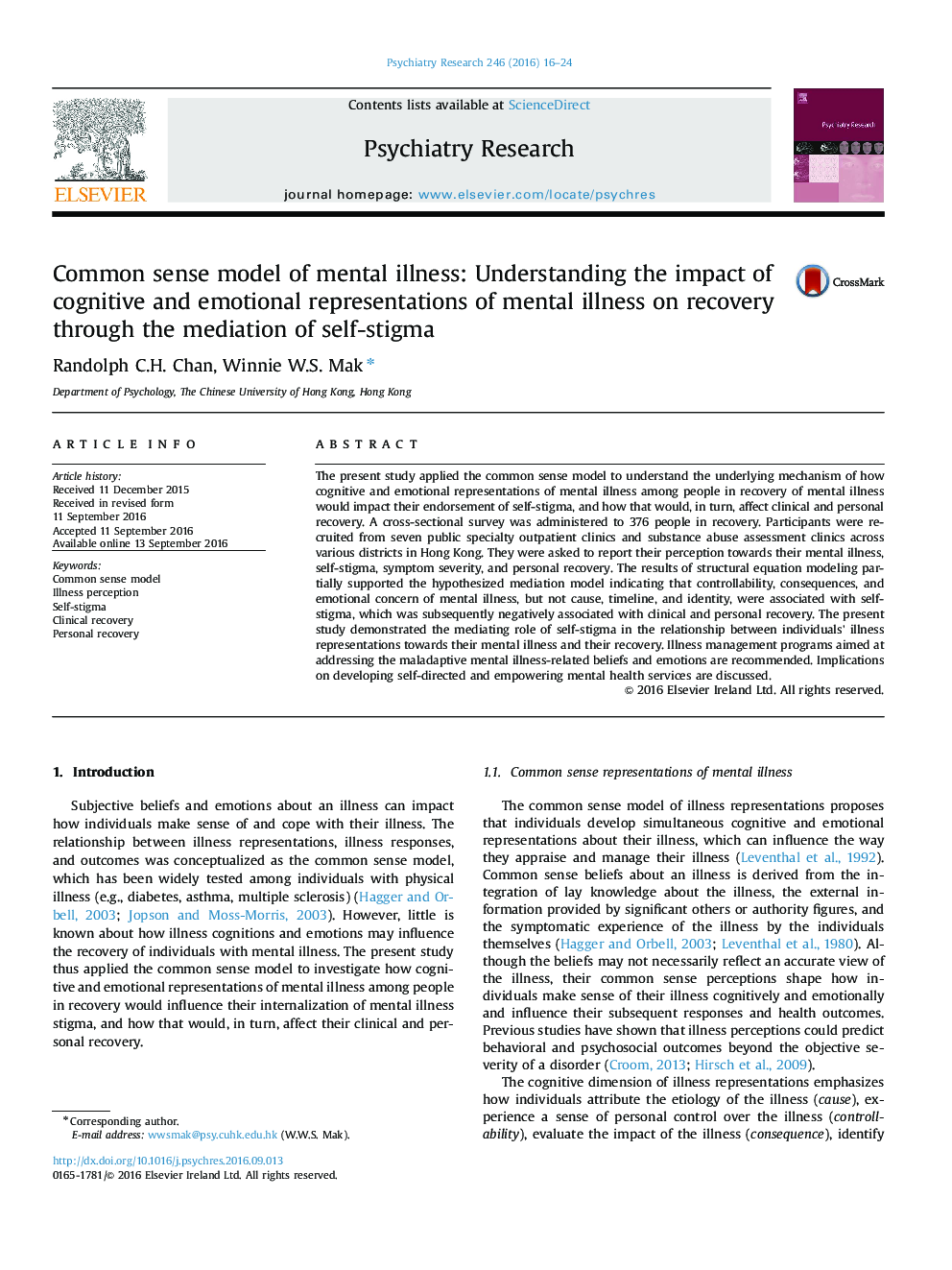| کد مقاله | کد نشریه | سال انتشار | مقاله انگلیسی | نسخه تمام متن |
|---|---|---|---|---|
| 4933760 | 1433800 | 2016 | 9 صفحه PDF | دانلود رایگان |
عنوان انگلیسی مقاله ISI
Common sense model of mental illness: Understanding the impact of cognitive and emotional representations of mental illness on recovery through the mediation of self-stigma
ترجمه فارسی عنوان
مدل سلامت روانی بیماری روانی: درک تاثیر بازنمود شناختی و احساسی بیماری های روانی بر بهبودی از طریق میانجی گری از خود
دانلود مقاله + سفارش ترجمه
دانلود مقاله ISI انگلیسی
رایگان برای ایرانیان
کلمات کلیدی
مدل حس مشترک درک بیماری، خودمختار، بازیابی بالینی، بازیابی شخصی،
ترجمه چکیده
در مطالعه حاضر، مدل ذهنی مشترک برای درک مکانیسم پایه ای از نحوه بازنمود شناختی و احساسی بیماری های روانی در میان مردم در بهبود بیماری های روانی، تأیید خود را بر روی خود گسستگی تأثیر می گذارند و این امر به نوبه خود بر روی فعالیت های بالینی و شخصی تاثیر می گذارد. بهبود. یک بررسی مقطعی برای 376 نفر در بهبودی انجام شد. شرکت کنندگان از هفت کلینیک ارزیابی کلینیک سرپایی و کلینیک های مورد استفاده مواد مخدر در مناطق مختلف هنگ کنگ استخدام شدند. از آنها خواسته شد تا ادعای خود را نسبت به بیماری روحی، خودمحور، شدت علامت و بهبودی شخصی گزارش دهند. نتایج مدل سازی معادلات ساختاری، بخشی از مدل مداخله فرضیه را پشتیبانی می کند که نشان می دهد که کنترل پذیری، پیامدها و نگرانی های عاطفی بیماری روانی، اما نه علت، زمان بندی و هویت، با خودمحور مرتبط بود، که بعدها منفی با کلینیکی و شخصی بهبود. در این مطالعه نقش میانجی گری خودمختلف در رابطه بین بازنمودهای بیماری های افراد نسبت به بیماری های روانی و بهبودی آنها مشخص شده است. برنامه های مدیریت بیماری با هدف رسیدگی به باورها و احساسات مرتبط با بیماری های روانی ناسازگار توصیه می شود. تأثیرات در توسعه خدمات خودگردان و توانمندسازی خدمات بهداشت روانی مورد بحث قرار گرفته است.
موضوعات مرتبط
علوم زیستی و بیوفناوری
علم عصب شناسی
روانپزشکی بیولوژیکی
چکیده انگلیسی
The present study applied the common sense model to understand the underlying mechanism of how cognitive and emotional representations of mental illness among people in recovery of mental illness would impact their endorsement of self-stigma, and how that would, in turn, affect clinical and personal recovery. A cross-sectional survey was administered to 376 people in recovery. Participants were recruited from seven public specialty outpatient clinics and substance abuse assessment clinics across various districts in Hong Kong. They were asked to report their perception towards their mental illness, self-stigma, symptom severity, and personal recovery. The results of structural equation modeling partially supported the hypothesized mediation model indicating that controllability, consequences, and emotional concern of mental illness, but not cause, timeline, and identity, were associated with self-stigma, which was subsequently negatively associated with clinical and personal recovery. The present study demonstrated the mediating role of self-stigma in the relationship between individuals' illness representations towards their mental illness and their recovery. Illness management programs aimed at addressing the maladaptive mental illness-related beliefs and emotions are recommended. Implications on developing self-directed and empowering mental health services are discussed.
ناشر
Database: Elsevier - ScienceDirect (ساینس دایرکت)
Journal: Psychiatry Research - Volume 246, 30 December 2016, Pages 16-24
Journal: Psychiatry Research - Volume 246, 30 December 2016, Pages 16-24
نویسندگان
Randolph C.H. Chan, Winnie W.S. Mak,
